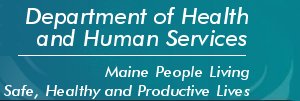|
|
MaineCare FMAP
| Office: |
Office of MaineCare Services |
| Program: |
MaineCare - Federal Medical Assistance Percentage |
| Budget Estimate: |
$435,242,882 |
| Federal Agency(s) |
Centers for Medicare & Medicaid Services / Health & Human Services |
Details:
- The final bill contains an increase of 6.2% in the rate.
- For Maine, that translates to a total of $334 million over the three years. This includes both the increased across the board rate and the adjustment for the high rate of unemployment.
- Maine currently qualifies for the first tier unemployment add-on which will raise our total FMAP rate to 72.4%
- The enhanced FMAP rate is available beginning on February 25, 2009.
- By drawing down any of the enhanced FMAP rate, a state attests that it is fully eligible for the enhanced payments. Maine is in the process of rolling back the premium increase in the Katie Beckett program and then we will be allowed to begin drawing the enhanced rate. The only other possible impediment to drawing this rate is the “prompt payment requirement” and we appear to be fine in that respect.
- There is an additional increase based on the increase in the unemployment rate. We currently appear to be in the second tier of the add-on. The increase is calculated by comparing the rate to the lowest quarter from 1/1/06 forward.
- There is a hold harmless provision that assures that the FMAP rate will not fall below the state’s FMAP rate for FY ’08.
- States cannot have eligibility standards, methodologies or procedures in place in the Medicaid state plan that are more restrictive than those in effect as of July 1, 2008 to be eligible for the enhanced FMAP rate.
- If the more restrictive policies are repealed by July 1, 2009, the state will be fully eligible for the enhanced rate retroactive to October 1, 2008.
- If the policies are not repealed until after July 1, 2009, the state will be eligible for the enhanced FMAP rate beginning with the first quarter that the policies are repealed.
- The enhanced FMAP rate does not apply to payments to individuals enrolled in Medicaid as a result of an expansion in the state income eligibility policies implemented on or after July 1, 2008.
- The state must report on compliance with the prompt payment requirements beginning with the date of enactment of the ARRA. Prompt payment provisions also apply to nursing facilities and hospitals. If the state is out of compliance with the prompt payment provisions, it will not be eligible for the enhanced rate for those days that it is not in compliance.
- None of the dollars realized from the enhanced FMAP rate may be deposited into any state reserve fund or rainy day fund.
- State must submit a report on its use of the additional federal funds from the enhanced rate by September 30, 2011.
- The Secretary of HHS may waive the prompt payment requirements for exigent circumstances.
- The DSH increase is 2.5% each year.
- Based upon the latest cost reports filed by the hospitals (2004) only 2 hospitals other than the state IMDs would be eligible for DSH (Northern Maine Medical Center and St. Mary's Regional Medical Center).
- A 2.5% increase would be $2,571,442. Based upon 2009 allotment this would increase IMD DSH by $846,576 and acute care hospitals (ACH) DSH by $1,722,866. 2010 would total $2,635,728.
There is also an extension of transitional Medicaid benefits to families that lose eligibility due to increased child or spousal support collections or increases in earned income or hours of employment. States are required to provide at least six months of work-related transitional coverage to families who received Medicaid in at least three of the six months prior to losing eligibility and who have a dependent child and may provide a second six-month period of coverage to certain families but may subject that coverage to premiums and may adjust the benefits. The stimulus bill extends the authorization for work-related coverage to December 31, 2010. It also permits states to provide the coverage even if the family was covered for fewer than three of the six months preceding ineligibility. And it allows states to extend the initial coverage period to 12 months, in lieu of the two different six-month periods.
|
Updates:
|
